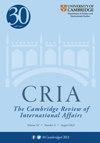How progressive was prohibition? Commentary on Smashing the Liquor Machine , the Francesco Guicciardini Prize Forum
IF 1.3
3区 社会学
Q2 INTERNATIONAL RELATIONS
引用次数: 0
Abstract
Click to increase image sizeClick to decrease image size Disclosure statementNo potential conflict of interest was reported by the author.Notes1 Forel, who makes no appearance in Schrad’s pages, was also a frank racist, a fact that further complicates generalisations about the progressive nature of prohibition.2 The same thing happened with narcotics enforcement, though blowback mattered less for narcotic policy because opiate addicts and marijuana smokers were fewer in number and less politically active than alcohol drinkers.Additional informationNotes on contributorsDavid T. CourtwrightDavid T. Courtwright, PhD, is a graduate of the University of Kansas and Rice University and Presidential Professor Emeritus at the University of North Florida. He is past president of the Alcohol and Drugs History Society and author of Dark Paradise (1982, 2001); Addicts Who Survived (1989, 2012); Forces of Habit (2001); and The Age of Addiction: How Bad Habits Became Big Business (2019). He is currently researching the opioid crisis.禁酒令有多进步?《砸酒机评论》,Francesco Guicciardini奖论坛
点击放大图片点击缩小图片披露声明作者未报告潜在的利益冲突。注1:福瑞尔在施拉德的书中没有出现,他也是一个坦率的种族主义者,这一事实进一步使关于禁酒的进步性质的概括变得复杂禁毒执法也出现了同样的情况,尽管反作用对禁毒政策的影响较小,因为鸦片成瘾者和大麻吸烟者的人数较少,在政治上也不如饮酒者活跃。作者简介:david T. Courtwright,博士,毕业于堪萨斯大学和莱斯大学,现任北佛罗里达大学名誉教授。他是酒精和毒品历史学会的前任主席,著有《黑暗天堂》(1982年,2001年);《幸存的瘾君子》(1989,2012);《习惯的力量》(2001);《成瘾时代:坏习惯如何成为大生意》(2019年)。他目前正在研究阿片类药物危机。
本文章由计算机程序翻译,如有差异,请以英文原文为准。
求助全文
约1分钟内获得全文
求助全文

 求助内容:
求助内容: 应助结果提醒方式:
应助结果提醒方式:


